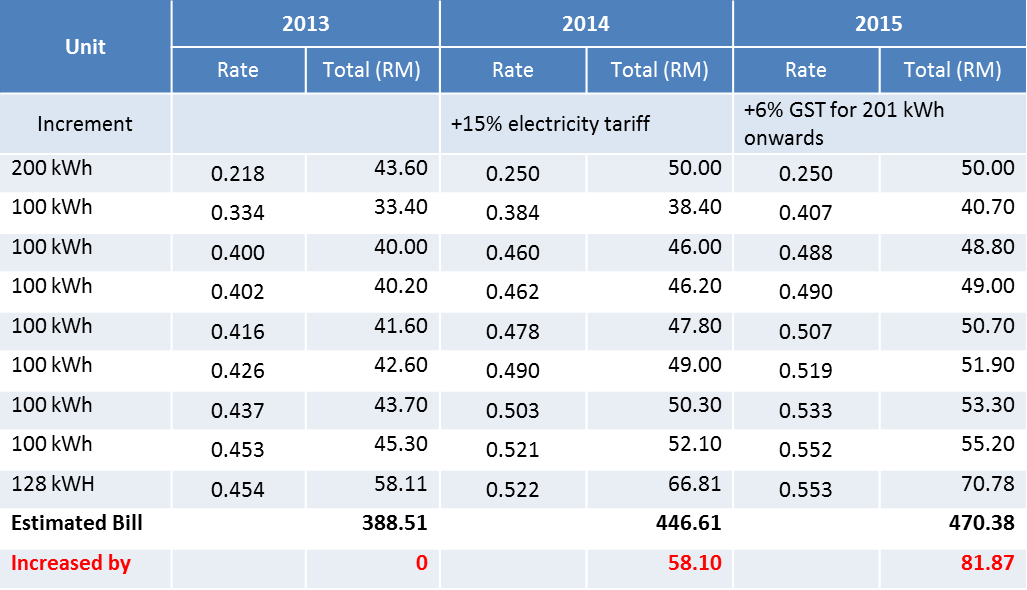WARNING: Malaysia’s Electricity Tariff Hike Ahead
Table of Contents
Increase in petrol prices, withdrawal of sugar subsidies, and a hike in assessment rates by DBKL; the worst is probably over – at least to unsuspecting Malaysians still reeling from the recent spike in cost of living. However, we are in for another surprise.
It has been reported that Malaysia’s electricity tariff hike is imminent as a result of a hike in fossil fuel price. The fuel price hike has resulted in the government’s desire to reduce subsidies for natural gas, which will lead to an increase in electricity rates for both industrial and household consumers.
According to the National Energy Balance 2011 report by the Energy Commission, 83.4% of Malaysia’s electricity is generated from the fossil fuels such as natural gas (52.5%) and coal (30.9%).
The last electricity tariff hike took effect in June 2011 when the subsidised gas price was raised to RM13.70 per million metric British thermal unit (mmbtu) from RM10.70 per mmbtu previously.
For the upcoming hike, consumers should brace themselves for a 10% – 20% increment in electricity tariffs next year.
“The quantum (of increase) is not finalised… but anything below 20% is reasonable,” said Energy, Green Technology and Water Minister Datuk Seri Dr Maximus Ongkili to The Star.
Why the need to increase?
According to Ongkili, the move to increase the electricity tariff is in line with the government’s plan to gradually cut subsidies.
The government’s current concern with high fiscal deficit has seen it tightening its belts in various areas to improve Malaysia’s fiscal position and the cost of electricity is not being overlooked in this exercise.
The reduction of subsidies by the government is also in line with intentions to boost the efficiency and competitiveness of Malaysia’s power industry, as well as to ensure sufficient returns for utility company Tenaga Nasional Berhad to cover its costs.
“The subsidy bill for the power sector has been creeping up… if the Government doesn’t do anything, the subsidy bill would go higher and higher,” MyPower Corp chief executive officer Datuk Abdul Razak Majid told The Star at a media briefing.
Furthermore, as the country gears towards Vision 2020 of becoming a high-income nation, the Federation of Malaysian Manufacturers vice-chairman Ramamuthie Varathan said reducing subsidies is a necessary move.
“You cannot achieve Vision 2020 without rationalising subsidies. The government cannot afford to continue with such subsidies,” he said to the Malaysia Chronicle.
How will your bill look like in 2014 and 2015?
The electricity consumption cost per household depends on family size, living habits, number and age of electrical appliances and hours of usage.
The current tariff rates are as follows:
| For the first 200 kWh (1 - 200 kWh) per month | 21.80 sen/kWh |
| For the next 100 kWh (201 - 300 kWh) per month | 33.40 sen/kWh |
| For the next 300 kWh (301 - 600 kWh) per month | 51.60 sen/kWh |
| For the next 300 kWh (601 - 900 kWh) per month | 54.60 sen/kWh |
| For the next kWh (901 kWh onwards) per month | 57.10 sen/kWh |
Source: Tenaga Nasional Berhad
With the estimated hike of between 10% and 20%, how much more will we be paying for our electricity consumption? Furthermore, with the implementation of GST for consumption above 200 kWH, a 6% tax will be charged on medium and heavy users.
If your monthly consumption is 1028 kWh, here is how your bill will look like in 2014 and 2015, compared to this year’s:
Using the above example of 1,028 kWH consumption a month, if tariff is increased by 15% next year, you will probably pay an extra RM58.10. Upon implementation of GST in 2015, you will have to pay RM81.87 more compared to 2014.
Comparing to neighbouring countries
The prevailing tariff rate in Malaysia is at 33.5 sen per kWh, which is about 8.5 sen below the “true cost” of power at 42 sen per kWh.
In comparison, electricity tariffs in the Philippines and Thailand are 58 sen per kWh and 48 sen per kWh respectively. However, it is important to note that both countries do not produce petrol, hence the lack of subsidies from the government.
How will this affect us?
According to Ongkili, the government would implement a stabilisation programme to protect consumers, especially those from a low-income group, when the tariff hike takes effect. However, the details of the programme have yet to be finalised.
A rebate of RM20 is also provided by the government since October 1, 2008 to all eligible Tenaga Nasional Berhad residential customers. This means that households using less than RM20 of electricity a month – making up at least 1.1 million households – are exempted from paying their electricity bills
The government is urged to delay the hike to educate the public first on using energy efficiently.
Penang Consumer’s Protection Association president Korisatan Karuppiah said this was not the right time to implement this plan.
Karuppiah added that the government needs to put more effort in getting the “go-green” messages across when it came to energy use.
Need some help combatting the petrol price hike? Here are some credit cards that can help you save.












